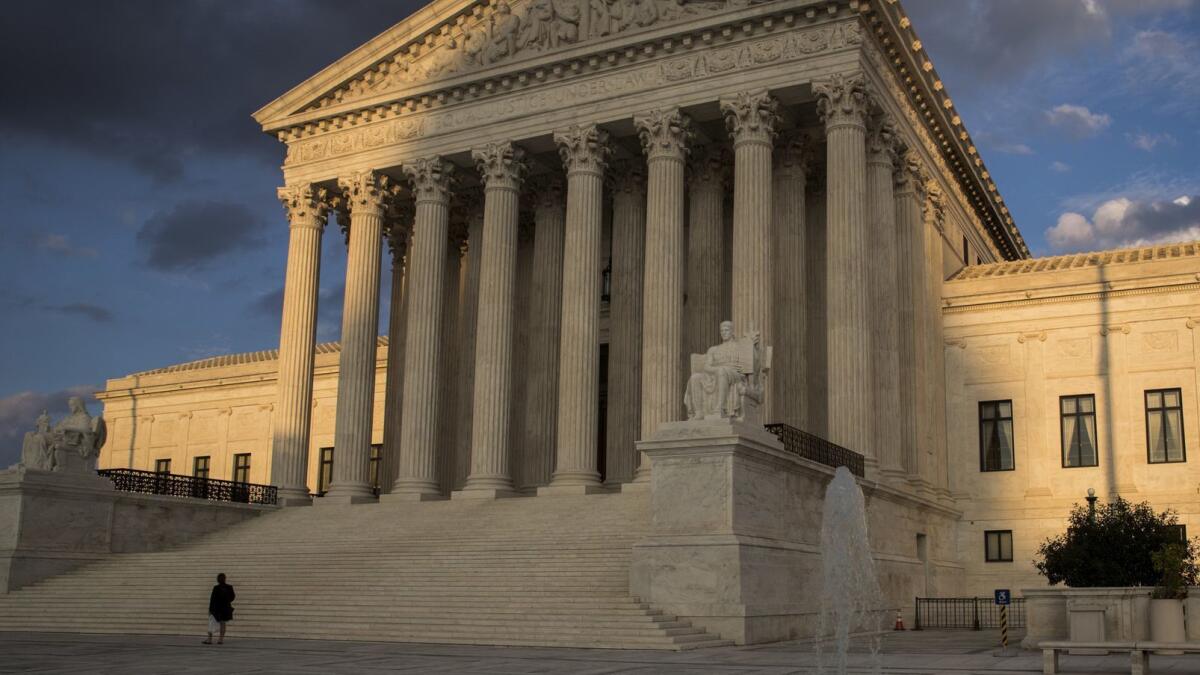Supreme Court likely to keep rule that allowed separate state and federal trials in Rodney King case

- Share via
Reporting from Washington — The Supreme Court justices sounded unwilling on Thursday to overturn a long-standing precedent that allows a state and the federal government to prosecute a person for the same crime — despite the Constitution’s ban on “double jeopardy.”
A lawyer for an Alabama man who was prosecuted in both state and federal court for being a felon in possession of a gun urged the court to restore the “original meaning” of the 5th Amendment protection against double jeopardy.
For the record:
3:35 p.m. Dec. 6, 2018A previous version said four police officers were convicted in the federal trial involving Rodney King. Four were charged but two were convicted.
“There is an ancient right not to be tried twice for the same crime,” said Louis Chaiten, the lawyer for the defendant.
But his position ran into surprisingly strong skepticism from both liberal and conservative justices, who said they were inclined to stick with precedent.
“This is a 170-year-old rule,” said Justice Elena Kagan, during a lively oral argument in which the justices debated the benefits of adhering to the Constitution’s original meaning versus respecting long-held court precedent, known as stare decisis.
Justice Brett M. Kavanaugh agreed with Kagan about the importance of precedent. “Part of the original understanding as well was stare decisis,” he said. “As Justice Kagan points out, it’s a doctrine of stability and humility that we take very seriously. ...The bar you have to clear, I believe, is not just to show that it’s wrong but to show that it’s grievously wrong, egregiously wrong.”
Based on their comments, Chief Justice John G. Roberts and Justices Samuel A. Alito, Stephen Breyer and Sonia Sotomayor indicated they were inclined to rule for the government and uphold existing exception, which was first established in the early 1800s.
Meanwhile, Justices Ruth Bader Ginsburg and Clarence Thomas had previously said that the rule should be overturned. And Justice Neil M. Gorsuch suggested he agreed with them.
The double jeopardy exception has been relied upon by law enforcement for decades.
In the 1960s, the U.S. Justice Department used the exception to protect blacks and civil rights workers in the South. If violent crimes against them resulted in acquittals before all-white state juries, federal prosecutors could bring a separate prosecution under federal civil rights law.
More recently in Los Angeles, this doctrine allowed federal prosecutors to charge and convict two police officers in the beating of motorist Rodney King after they had been acquitted of essentially the same charges under state law in Simi Valley.
Some legal experts said a high court ruling striking down the “separate sovereigns” exception could pose problems for special counsel Robert S. Mueller III and his prosecutions of advisors to President Trump, including his former campaign manager, Paul Manafort.
If Trump were to pardon Manafort for the federal crimes and the Supreme Court eliminated the exception, states could be limited in bringing their own charges for the same crimes.
Defending the current rule, a government lawyer said states in theory could undercut federal law enforcement if only one prosecution were allowed. And as an example, he cited California and marijuana.
“Let’s say someone’s caught in California with 100 kilograms of marijuana, which is a misdemeanor in California, but is a felony under federal law,” Eric Feigin, an assistant solicitor general, told the court. If he pleaded guilty to that offense, “it would bar a federal prosecution for intent to distribute, which would be considered a greater offense.” He cited several such examples warning the justices of the consequences of changing the current rule.
The case before the court involves Terance Gamble, an Alabama man who was convicted by state authorities and then by federal prosecutors for being a felon in possession of a gun.
When Gamble was stopped for a traffic violation in 2015, a police officer found a loaded handgun in his car. He had pleaded guilty in 2008 to a robbery, a felony crime. He was later charged with threatening his girlfriend with a gun in 2013 and with firing shots into a “title loan business” in 2014. State prosecutors charged him with these offenses, including being a felon in possession of a firearm. He received a year in prison. But federal prosecutors also indicted him as a felon with a gun, and he eventually was sentenced to about four years in federal prison.
As expected, the 11th Circuit Court in Atlanta rejected Gamble’s appeal. “Prosecution in federal and state court for the same conduct does not violate the double jeopardy clause because the state and federal governments are separate sovereigns,” the judges said.
The court has upheld the exception ever since it was first established, but not without debate.
“An act denounced as a crime by both national and state sovereignties is an offense against the peace and dignity of both and may be punished by each,” Chief Justice William Taft wrote in 1922. His opinion upheld the state conviction of Vito Lanza, a bootlegger outside Seattle for selling illegal liquor and his subsequent federal prosecution under the new National Prohibition Act.
Other justices never embraced the idea. “The legal logic used to prove one thing to be two is too subtle for me to grasp,” Justice Hugo Black said in 1959.
More stories from David G. Savage »
Twitter: DavidGSavage
More to Read
Get the L.A. Times Politics newsletter
Deeply reported insights into legislation, politics and policy from Sacramento, Washington and beyond. In your inbox three times per week.
You may occasionally receive promotional content from the Los Angeles Times.











